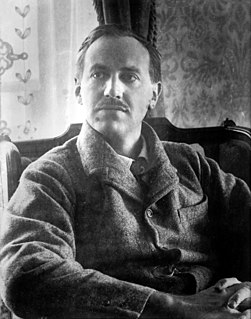A Quote by Lord Dunsany
It is very seldom that the same man knows much of science, and about the things that were known before science came.
Related Quotes
Although this may seem a paradox, all exact science is dominated by the idea of approximation. When a man tells you that he knows the exact truth about anything, you are safe in inferring that he is an inexact man. Every careful measurement in science is always given with the probable error ... every observer admits that he is likely wrong, and knows about how much wrong he is likely to be.
The whole point of science is that most of it is uncertain. That's why science is exciting--because we don't know. Science is all about things we don't understand. The public, of course, imagines science is just a set of facts. But it's not. Science is a process of exploring, which is always partial. We explore, and we find out things that we understand. We find out things we thought we understood were wrong. That's how it makes progress.
Science fiction, as I mentioned before, writes about what is neither impossible nor possible; the fact is that, when the question of possibility comes up in science fiction, the author can only reply that nobody knows. We haven't been there yet. We haven't discovered that yet. Science fiction hasn't happened.
Common sense … has the very curious property of being more correct retrospectively than prospectively. It seems to me that one of the principal criteria to be applied to successful science is that its results are almost always obvious retrospectively; unfortunately, they seldom are prospectively. Common sense provides a kind of ultimate validation after science has completed its work; it seldom anticipates what science is going to discover.
If all our common-sense notions about the universe were correct, then science would have solved the secrets of the universe thousands of years ago. The purpose of science is to peel back the layer of the appearance of the objects to reveal their underlying nature. In fact, if appearance and essence were the same thing, there would be no need for science.
Science fiction is fantasy about issues of science. Science fiction is a subset of fantasy. Fantasy predated it by several millennia. The '30s to the '50s were the golden age of science fiction - this was because, to a large degree, it was at this point that technology and science had exposed its potential without revealing the limitations.
I very much was inspired by Bill Bryson. He does cover science, but more often, it's a mixture of science and travel, and whatever he happens to be writing about - Shakespeare, Australia, the United Kingdom, or when he covers science in 'A Short History Of Nearly Everything' - he has an incredible ability to be both entertaining and enlightening.
Pedants make a great rout about criticism, as if it were a science of great depth, and required much pains and knowledge--criticism however is only the result of good sense, taste and judgment--three qualities that indeed seldom are found together, and extremely seldom in a pedant, which most critics are.





































